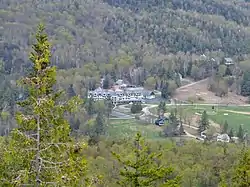Ausable Club | |
 The clubhouse from Noonmark Mountain | |
  | |
| Location | 137 Ausable Rd., St. Huberts, New York |
|---|---|
| Coordinates | 44°9′7″N 73°46′51″W / 44.15194°N 73.78083°W |
| Area | 7 acres (28,000 m2)[1] |
| Built | 1890 |
| Architect | Wilson Brothers & Company |
| Architectural style | Queen Anne, Stick/Eastlake |
| Website | http://www.ausableclub.org/ |
| NRHP reference No. | 05000683 |
| Added to NRHP | July 06, 2005[2] |
The Ausable Club, in St. Huberts, New York, is the name of a club and the clubhouse of the Adirondack Mountain Reserve (AMR), which upon the initiative of William George Neilson, formed in 1887 to save the lands around Beede's Hotel from the lumber industry. The Reserve once owned most of the Adirondack High Peaks. The club is also the home of the Adirondack Trail Improvement Society, known as A.T.I.S, which developed and still maintains many of the trails to the high peaks. The clubhouse property, also known as St. Hubert's Inn, Beede House, or Beede Heights Hotel, is listed on the National Register of Historic Places.[1]
Club members have included Harvard president James Conant, clergyman Henry Sloane Coffin, aeronautical engineer Jerome Hunsaker, painter Harold Weston, American statesman John J. McCloy[3] and US Secretary of War Henry L. Stimson, who blazed a trail up nearby Noonmark Mountain that is still in use. Certain Easement Trails on AMR/AC lands are open to the public, with restrictions, and provide access to many of the High peaks trails: Basin Mountain, Mount Skylight, Mount Marcy, Mount Haystack, Mount Colvin, Nippletop Mountain, Dial Mountain, Lower Wolfjaw Mountain, Upper Wolfjaw Mountain, Armstrong Mountain, Gothics, Sawteeth, Saddleback Mountain, Noonmark Mountain, Round Mountain, and Rainbow and Beaver Meadow Falls.[1]


History
The present clubhouse sits on the 600-acre (240 ha) site of Beede's Hotel, built in 1876. Beede's was one of the first of the Adirondack hotels to cater to wealthy sportsmen eager to escape city life during the summer, a phenomenon that predated the Civil War, but that was greatly accelerated by advances in transportation offered by steam ships and railroads. Beede's was notorious for its austere accommodations, but no less famous for its setting near Upper and Lower Ausable Lakes and the Ausable River, and for its views of Giant and Noonmark Mountains, Sawteeth and Mount Colvin. Guides were available to lead parties up the rocky ravine of the Ausable to lean-to shelters on the lakes, and thence to the high peaks above.[1]
When it became known that the woods around Beede's was going to be timbered by the lumber company which owned them, a prominent Philadelphia mining engineer and summer resident William G. Neilson, secured a two-month option on the property dated September 20, 1886. Neilson approached several friends to join in the purchase of 25,000 acres (100 km2), including the two lakes and nearby mountains. By December 1, 1886, William Neilson, William Alderson, George Burnham, Charles Hinchman, J.W. Fuller, Richard Dale and Edward Howell provided the down payment to secure a two-year warranty deed which was signed by Neilson and Alderson. By October 1887, twenty-nine stockholders had formed a corporation, the Adirondack Mountain Reserve. Although the Reserve prohibited hunting and camping, the land remained open to the public for hiking. The AMR added to its holdings, reaching a peak of 40,000 acres (16,000 ha) in 1910. However, in 1923 and again in 1978, land was sold to the state of New York as part of the Adirondack Park, so that present holdings amount to about 7,000 acres (2,800 ha).[1]
In 1890, Neilson approached his friend Beede, and again, secured a two month option to purchase the Beede Hotel. Neilson then presented the option to the AMR Shareholders who agreed to purchase the Hotel property and form the Keene Heights Hotel Company which was organized to operate as a financially separate entity. In the midst of the sale, the building burned to the ground. The Corporation then hired the Philadelphia architectural firm Wilson Brothers & Company to design the St. Hubert's Inn, and four months later the new hotel was opened as the present structure. At the same time, Neilson purchased the 40 acre- Widow Beede- property which he then donated to the organization. By 1904 due to a Park wide decline in public interest, compounded by the forest fires in 1903, the Hotel proved unprofitable, and the Hotel Company was closed in 1904. It is interesting to note that the Reserve had remained profitable. In 1905, the AMR and Hotel Company were reformed as one financial entity and is now known as the Adirondack Mountain Reserve/ Ausable Club. [1]
The clubhouse
The clubhouse is a 3+1⁄2-story clapboard building with sparing use of Queen Anne details, arranged in two long blocks joined at a 22.5 degree angle where a large 3-story octagonal porch provides sheltered access to the surrounding views. In addition, a porch runs the full length of the first floor. Protected by its status on the National Register of Historic Places, the building has suffered remarkably little change, inside or out, since it was built.[1]
References
- 1 2 3 4 5 6 7 Steven Clark (May 11, 2005). "National Register of Historic Places Registration: Ausable Club / St. Hubert's Inn; Beede House; Beede Heights Hotel (Project number 04PR06792; Historic Register number 04NR05398)". New York State Office of Parks, Recreation and Historic Preservation. Archived from the original on May 7, 2017. See also: "Accompanying 15 photos, exterior and interior, undated". Archived from the original on May 7, 2017.
- ↑ "National Register Information System". National Register of Historic Places. National Park Service. April 15, 2008.
- ↑ Isaacson, Walter; Thomas, Evan (1986). "World Courts". The Wise Men: Six Friends and the World They Made (1st ed.). New York: Simon & Schuster. p. 125. ISBN 0671504657.
External links
- Official website
- About, ausableclub.org
- Adirondack Journey - Principal Adirondack Trailheads